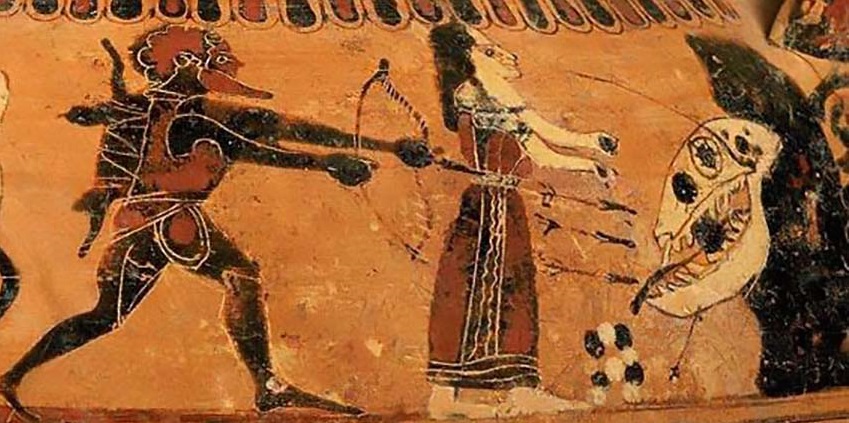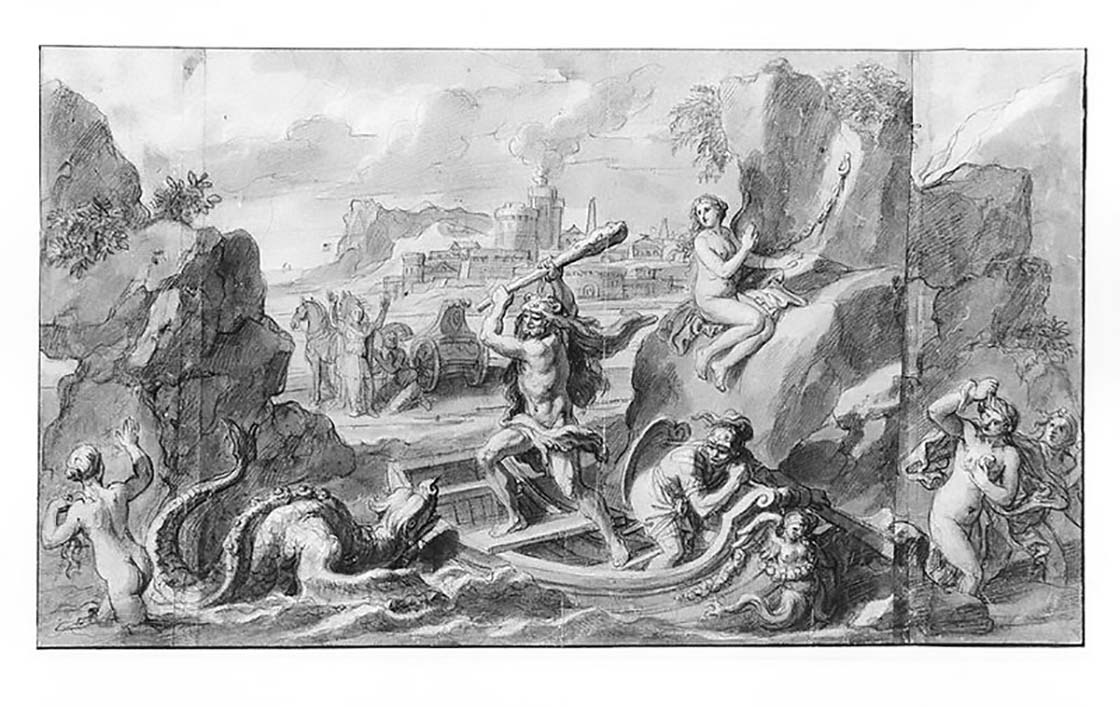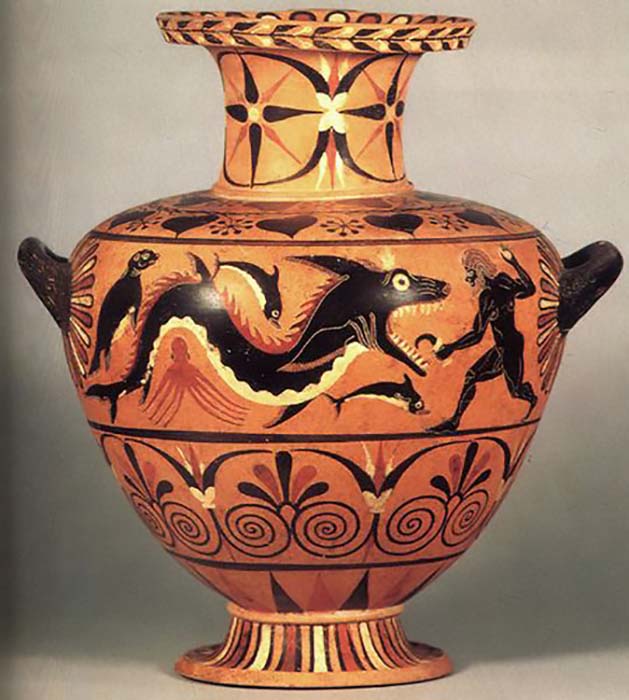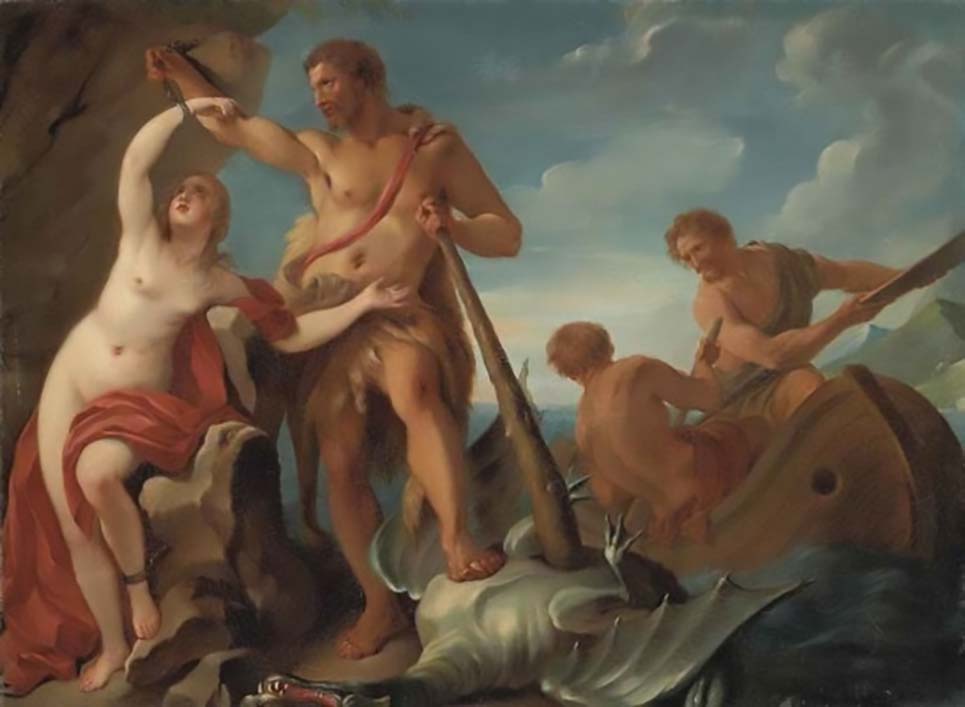The Trojan Cetus
The child of Phorcys and Ceto
The Trojan Cetus was a monster who appears in the texts of Ancient Greece, and as the name suggests was a beast associated with the city of Troy.
CHILD OF PHORYCS AND CETO
The name Cetus can be taken to mean whale or large fish, but in Greek mythology, it refers to a sea-monster; and the Trojan Cetus is generally considered to be a monstrous child of the primordial sea deities, Phorcys and Ceto.
This parentage makes the Trojan Cetus sibling to the Aethiopian Cetus, Ladon, Echidna, the Gorgons and the Graeae.
In antiquity, the Trojan Cetus was normally depicted as a sea-serpent, although occasionally it was also depicted as having forelegs.
THE CETUS OF TROY
The Trojan Cetus is associated with the city of Troy, and it was in the time of King Laomedon that the monster came to land of Laomedon.
The gods Poseidon and Apollo had come to troy at a time when they were exiled from Mount Olympus for plotting against Zeus. Not revealing their true identities, Poseidon promised to build defensive walls for the city, whilst Apollo offered to tend the king’s livestock, for payment.
Poseidon thus built impenetrable walls, aided by Aeacus, who built sections of wall which were not quite as strong, whilst the livestock tended to by Apollo, flourished, with each animal giving birth to twins, greatly increasing the size of King Laomedon’s livestock holdings.
When the gods came for payment, Laomedon refused to pay, and instead expelled the two from his kingdom; Laomedon still being unaware about just who he was expelling without payment.
In retribution, Apollo would send a plague and pestilence upon Troy, whilst Poseidon first sent forth a tsunami, before dispatching the Trojan Cetus to ravage the shoreline of Laomedon’s kingdom.

HERACLES AND THE TROJAN CETUS
King Laomedon sought guidance from an oracle about how he could rid Troy of the sea-monster, but the proclamation from the oracle was not what he desired to hear, for he would be forced to sacrifice his own daughter, Hesione.
Hesione was thus chained to rocks in preparation for the appearance of the Trojan Cetus.
It was at this time that Heracles, possibly in conjunction with the Argonauts, or else during Heracles' Labours, arrived at Troy, and being quickly appraised of the situation, Heracles went to Laomedon and told the king that he could save his daughter, and kill the Trojan Cetus, if Laomedon would give him the Golden Vine and divine horses that Zeus had given to Tros, as compensation after the abduction of Ganymede.
Laomedon agreed, and so Heracles went down to the shoreline.
The Trojan Cetus might have been a powerful monster, but it was no match for Heracles, and it was commonly said that the Trojan Cetus fell beneath a barrage of arrows unleashed by Heracles, before a death blow was inflicted by the son of Zeus with his mighty club.
A less common method of death for the Trojan Cetus, sees Heracles enter the Trojan Cetus through the monster’s mouth, before opening up the stomach of the monster from the inside with a boat hook.
With the Trojan Cetus slain, and Hesione rescued, Laomedon refused to pay Heracles the promised prizes; a decision which would later prove deadly for Laomedon, for Heracles would return to Troy to gain his revenge.

CLASSICAL LITERATURE QUOTES
Homer, Iliad 20. 145 ff (trans. Lattimore) (Greek epic C8th B.C.) :
"The stronghold of godlike Herakles (Heracles) [near Troy], earth-piled on both sides, a high place, which the Trojans and Pallas Athene had built him as a place to escape where he could get away from the Ketos (Cetus, Sea-Monster) when the charging monster drove him away to the plain from the sea-shore."
Pseudo-Apollodorus, Bibliotheca 2. 103 (trans. Aldrich) (Greek mythographer C2nd A.D.) :
"Poseidon sent a Ketos (Cetus, Sea-Monster) which would come inland on a flood-tide and grab people on the plain. Oracles proclaimed that there would be release from these adversities if Laomedon were to set his daughter Hesione out as a meal for the Ketos, so he fastened her to the rocks by the seaside. When he saw her lying there, Herakles promised to save her in return for the mares which Zeus had donated as satisfaction for the abduction of Ganymedes. Laomedon agreed to this, and so Herakles slew the monster and rescued the girl."
Lycophron, Alexandra 470 ff (trans. Mair) (Greek poet C3rd B.C.) :
"She [Hesione] it was that the babbler, the father of three daughters, standing up in the council of his townsmen, urged should be offered as dark banquet for the grey hound [the Ketos (Sea-Monster)], which with briny water was turning all the land to mud, spewing waves from his jaws and with fierce surge flooding all the ground. But, in place of the woodpecker [Hesione], he swallowed in his throat a scorpion [Herakles] and bewailed to Phorkys (Phorcys) the burden of his evil travail, seeking to find counsel in his pain.”
Lycophron, Alexandra 951 ff :
“Laomedon, stung by the ravages of the gluttonous Ketos (Cetus, Sea-Monster), gave to mariners to expose the three daughters of Phoinodamos." [N.B. Phoinodamos refused to expose his own daughters to the monste which forced Laomedon to sacrifice his daughter Hesione.]
Strabo, Geography 13. 1. 32 (trans. Jones) (Greek geographer C1st B.C. to C1st A.D.) :
"Herakles (Heracles) waged an unjust one [war against Troy] ‘on account of the horses of Laomedon.’ But writers set over against this reason the myth that it was not on account of the horses but of the reward offered for Hesione and the Ketos (Cetus, Sea-Monster)."
Diodorus Siculus, Library of History 4. 42. 1 (trans. Oldfather) (Greek historian C1st B.C.) :
“They [the Argonauts] encountered a storm and were carried to Sigeion (Sigeum) in the Troad. When they disembarked there, it is said, they discovered a maiden [Hesione] bound in chains upon the shore, the reason for it being as follows. Poseidon, as the story runs, became angry with Laomedon the king of Troy in connection with the building of its walls, according to the mythical story, and sent forth a Ketos (Cetus, Sea-Monster) to ravage the land. By this monster those who made their living by the seashore and the farmers who tilled the land contiguous to the sea were being surprised and carried off. Furthermore, a pestilence fell upon the people and a total destruction of their crops, so that all the inhabitants were at their wits end because of the magnitude of what had befallen them. Consequently the common crowd gathered together into an assembly and sought for a deliverance from their misfortunes, and the king, it is said, dispatched a mission to Apollon to inquire of the god regarding what had befallen them. When the oracle, then, became known, which told that the cause was the anger of Poseidon and that only then would it cease when the Trojans should of their free will select by lot one of their children and deliver him to the monster for his food, although all the children submitted to the lot, it fell upon the king's daughter Hesione. Consequently, Laomedon was constrained by necessity to deliver the maiden and to leave her, bound in chains, upon the shore. Here Herakles, when he had disembarked with the Argonauts and learned from the girl of her sudden change of fortune, rent asunder the chains which were about her body and going up to the city made an offer to the king to slay the Ketos (Sea-Monster). When Laomedon accepted the proposal and promised to give him as a reward his invincible mares, Herakles (Heracles) they say, did slay the Ketos and Hesione given the choice either to leave her home with her saviour or to remain in her native land with her parents. The girl, then chose to spend her life with the stranger, not merely because she preferred the benefaction that she had received to the ties of kinship, but also because she feared that a Ketos might again appear and she be exposed by the citizens to the same fate as that from which she had just escaped.”
Diodorus Siculus, Library of History 4. 32. 1 :
"When Herakles was on the expedition with Iason to get the golden fleece and had slain the Ketos (Cetus, Sea-Monster), Laomedon had withheld from him the mares which he had agreed to give him.”
Quintus Smyrnaeus, Fall of Troy 6. 283 ff (trans. Way) (Greek epic C4th A.D.) :
"There where swift Hellespont meets the outer sea, lay the Ketos (Cetus, Sea-Monster) slain by his ruthless shafts, while from Hesione he rent her chains."
Philostratus the Younger, Imagines 12 (trans. Fairbanks) (Greek rhetorician C3rd A.D.) :
"[Ostensibly a description of an ancient Greek painting :] Hesione. It is not, I think, at anyone's command that the noble Herakles is undertaking this labour, nor is it possible to say this time that Eurystheus is causing him travail; rather we must say that, having made valour his master, he is submitting to tasks of his own choosing. Else why is he confronting so terrible a Ketos (Cetus, Sea-Monster)? For you see what big eyes it has, that turn about their encircling glance and glare so terribly, and that pull down over themselves the overhanging brow all savage and covered with spines; and how sharp is the projecting snout that reveals jagged ‘teeth in triple row,’ some of which are barbed and bent back to hold what they have caught, while others are sharp-pointed and rise to a great height; and you see how huge a head emerges from its crooked and supple neck. The size of it is indeed incredible, when briefly described, but the sight of it convinces the incredulous. For as the monster's body is bent not at one point along but at many points, the parts which are under the sea are indeed visible, though in a way to deceive the accuracy of vision because of their depth, while the other parts rise from the water and would look like islands to those unacquainted with the sea.
The Ketos (Sea-Monster) was at rest when we first encountered it; but now it is in motion with a most violent onrush and raises a great noise of splashing even though the weather is calm, and yonder wave which is raised by the force of its charge surges, on the one hand, around its exposed parts as it flows over them and makes them show white beneath, and, on the other, dashes against the shore; and the bending of its tail, which tosses the sea far aloft, might be compared to the sails of a ship shining with many colours.
This wonderful man [Herakles], however, has no fear of these things, but the lion's skin and the club are at his feet ready for use if he should need them; and he stands naked in the attitude of attack, thrusting forward his left leg so that it can carry the whole weight of his body as he shifts it to secure swiftness of movement, and while his left side and left hand are brought forward to stretch the bow, his right side is drawn back as his right hand draws the string to his breast. We need not seek the reason for al this, my boy, for the maiden who is fastened to the rocks is exposed as prey for the monster, and we must believe her to be Hesione, the daughter of Laomedon. And where is her father? Within the walls of the city, it seems to me, in a look-out where he can see what is going on. For you see the circuit of the city and the battlements full of men, and how they stretch out their arms towards heaven in prayer, overcome no doubt with prodigious fear lest the Ketos (Sea-Monster) even attack the city wall, since it rushes forward as if it meant to go ashore. As for the beauty of the maiden, the occasion precludes my describing it in detail, for her fear for her life and the agony occasioned by the sight she sees are withering the flower of her beauty; but nevertheless those who see her may conjecture from her present state what its full perfection is."
Pseudo-Hyginus, Fabulae 31 (trans. Grant) (Roman mythographer C2nd A.D.) :
"He [Heracles] killed at Troy the Cetus (Sea-Monster) to whom Hesione was offered."
Pseudo-Hyginus, Fabulae 89 :
"Neptunus [Poseidon] and Apollo [Apollon] are said to have built a wall around Troy. King Laomedon vowed that he would sacrifice to them from his blocks whatever should be born that year in his kingdom. This vow he defaulted on through his avarice. Other writers say that he promised to little. Because of this Neptunus sent a Cetus (Sea-Monster) to plague Troy, and for this reason the king sent to Apollo for advise. Apollo angrily replied that if Trojan maidens were bound and offered to the monster, there would be an end to the plague. When many girls had been devoured, and the lot fell on Hesione, and she was bound to the rocks, Hercules and Telamon came there, The Argonauts being on their way to Colchis, and killed the Cetus."
Ovid, Metamorphoses 11. 207 ff (trans. Melville) (Roman epic C1st B.C. to C1st A.D.) :
"With Tridentiger (the god who wields the trident) [Poseidon], father of the main, assuming mortal shape, he [Apollon] built the walls for Phrygia's monarch [King Laomedon], striking at the start a golden bargain for those battlements. The work stood built : the king denied the debt, with perjury to cap his perfidy. ‘You'll pay for this!’ said Ocean's lord (Rector Maris) and sloped all his vast waters to the shores of Troiae (Troy), tight-fisted Troiae, and filled the land to form a seascape, swept away the farmers' wealth and whelmed the countryside beneath the waves. Nor did this punishment suffice; the king's daughter [Hesione] was claimed as well to satisfy a Monster of the Deep (Monstrum Aequoreum). Chained to the rocks, Alcides [Heracles] rescued her and claimed his fee, the promised horses, and, the price of that great task denied him, seized the battlements, twice-perjured battlements, and conquered Troiae. Nor did his battle-comrade Telamon leave without honour there--Hesione was the reward he won."
Valerius Flaccus, Argonautica 2. 450 ff (trans. Mozley) (Roman epic C1st A.D.) :
"Hercules [Heracles] with Telamon at his side passed along the shore that broke back in a pleasant inlet, a voice fell upon their ears, ever and anon sounding mournfully as each wave broke and murmured away again. Full of amaze they went slowly, following the viewless track of the voice; now its sounds distinct: a maiden [Hesione] abandoned to a cruel death was calling all men and gods to help her. At this the heroes press on more keenly, resolved to bring succour , , , Hercules halted, and straining his gaze upwards sees upon a high crag galling shackles and the worn face of a maiden, her eyes brimful to the verge of weeping. The hero spoke : ‘Maiden, what is thy name and thy family? What lot is thine, tell me? Wherefore do bonds strain thy hands?’
Trembling and casting down her eyes in sorrow and shame she [Hesione] replied : ‘I do not deserve these sufferings; thou seest here the last gifts of my parents, these rocks covered over with purple and gold. Our stock sprang from Ilus, happy once until envious Fortuna (Fortune) [Tykhe] deserted the home of Laomedon. First of all there fell a sickness and the temperate airs were driven from the clear sky; the country blazed with pyre rivalling pure, when there burst forth a roar, and waves that made all Ida's forests with their lairs shudder. Lo! Of a sudden there rose from the sea a Beast, of monstrous bulk; not by any mountain, not by the sea we know couldst thou measure it. A band of young maidens is sacrificed to its rage amid the tears and embraces of parents. This the lot, this doth horned Ammon [i.e. the oracle of Ammon in Libya] command--that a maiden's life and her body that drew death's lot to be doomed; 'tis me that the cruel urn condemns to the rocks. But oh! if once again Heaven inclines to the Phrygians, and if thou art he whose coming augury and Heaven's omens promised, he for whom my father now feeds snow-white Horses in the pasture of his vow, the pledged reward for saving my life, say Yea and rescue both me and wasted Troy from the dragon, for so thou canst; since never did I behold so broad a breast while Neptunus [Poseidon] was raising the walls to meet the stars, nor had Apollo such mighty shoulders or such a quiver.’
The place lent strength to her words, the doleful aspect too of the captive shore, the funeral pyres and the sky that hooded o'er the city . . . Meanwhile far off Neptunus [Poseidon] gave the signal, and at the same moment a roar came from the gulf, the Draco's (Dragon's) home, and the curse of Sigeum drove the waters on a heap, while its flashing eyes flicker beneath a blue-grey film, and a sound of thunder shakes the maw circled with a triple row of fangs, as its tail reaches backward over the sea it has covered, and the proud neck sweeps the streaming coils onward. The burden of its thousand folds is upon the waters, and they lap its flanks and move with it, while the storm it makes drives it speeding forward to the terror-stricken shores . . . Lo! Telamon stands in amaze at the hero growing fiercer with the frenzy of the chosen battle, at the swelling muscles and the body so huge in its armour, and how the loaded quiver smites his back. But he, with a prayer to his father and the gods of the sea and his own weapons, leapt upon a rock, while he shuddered at the sea stirred to tis depths and the towering dragon's vast coils . . . At the same instant the beast reared its awful bulk and its mountainous back, drawing nearer with its huge shadow; one would think all Ida trembled and was being dashed in pieces and that towers overthrown rose up again. Hercules grasped his bow and piled it with all his cloud of arrows. It stirred no more than great Eryx from its foundations . . . Now the space is short, and useless for the flying shaft. Oh, then he groaned! The madness of that vain task! The silent shame, and the maiden pale once more; he casts his weapons from him, bethinks him of the rocks and stones at hand, and nay that time with the wind's help or the crashing sea had loosened, he breaks off, wrenching them from the bottom of the deep sea. And now the monster is upon them with all its coils, now closer than ever it gapes upon its wretched victim. High in the midst of the waters stands Hercules, awaiting its onset, and swifter than the neck can rise he strikes it down with a rock; then redoubles the shattering blows of his knotted club, until the beast sinks beneath the waves, its coils slackening along all the shallows; the Idaean mother [Rhea-Kybele] with her votaries and the rivers from the hilltops raise lament. . . . Straightaway Hercules springs up the crags to the top of the harsh rocks, and frees the maiden's hands from the fetters that bind her to the cliff, and girds his armour on his vaunting shoulders. Thence with triumphant steps he passes across the safe shore to meet the king [Laomedon of Troy].”

Sourced
GREEK
Homer, The Iliad - Greek Epic C8th B.C.
Apollodorus, The Library - Greek Mythography C2nd A.D.
Lycophron, Alexandra - Greek Poetry C3rd B.C.
Diodorus Siculus, The Library of History - Greek History C1st B.C.
Strabo, Geography - Greek Geography C1st B.C. - C1st A.D.
Philostratus the Younger, Imagines - Greek Rhetoric C3rd A.D.
Quintus Smyrnaeus, Fall of Troy - Greek Epic C4th A.D.
ROMAN
Hyginus, Fabulae - Latin Mythography C2nd A.D.
Ovid, Metamorphoses - Latin Epic C1st B.C. - C1st A.D.
Valerius Flaccus, The Argonautica - Latin Epic C1st A.D.
"Theoi"
"Greek Legends and Myths"













